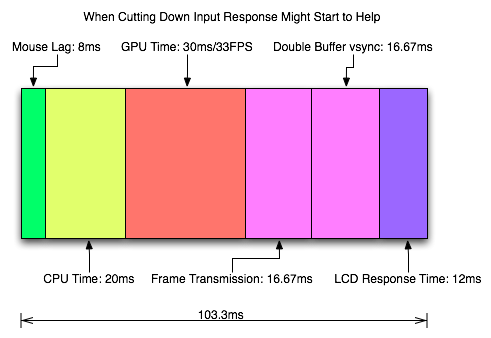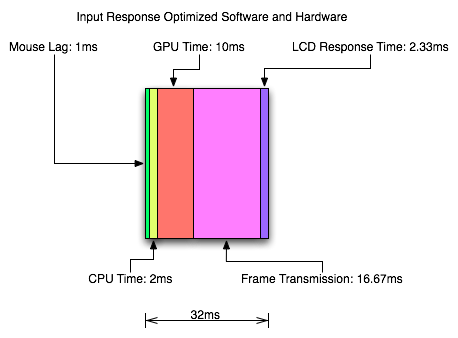Page 1 of 2
Input Lag of Strobe Backlights
Posted: 17 Dec 2013, 23:45
by Chief Blur Buster
Just like prad.de and tftcentral.co.uk, I also have a photodiode oscillscope.
With my photodiode oscillscope (time measured from Direct3D Present() to first light hitting photodiode) -- I've measured 11ms average for LightBoost and 19ms average for Turbo240. They are pretty good compared to the 60Hz alternative, however. And the color quality of Turbo240 is significantly better, much brighter, and is prefered if you really like the LightBoost effect.
Incidentially, for LightBoost, this is in comparision to 7ms lag average (~3ms for top edge of screen, ~7ms for middle, ~11ms for bottom edge of screen) for non-LightBoost. So LightBoost only has about ~4ms of extra input lag over non-LightBoost on the same monitor.
Re: Input Lag of Strobe Backlights
Posted: 18 Dec 2013, 16:18
by TheExodu5
Interesting...I never thought LightBoost would contribute to input lag. Do you know why it does? I assumed that backlight strobing was independant from drawing the frame, but I guess not? In any case, 4ms shouldn't be perceivable, so that's good to know.
Re: Input Lag of Strobe Backlights
Posted: 18 Dec 2013, 17:02
by Chief Blur Buster
TheExodu5 wrote:Interesting...I never thought LightBoost would contribute to input lag. Do you know why it does? I assumed that backlight strobing was independant from drawing the frame, but I guess not? In any case, 4ms shouldn't be perceivable, so that's good to know.
That is because the monitor is being refreshed in the dark before the backlight is strobed. Since the human eyes do not see the image till a bit later, that is a smidgen of extra lag. Check the high speed video of LightBoost at
http://www.blurbusters.com/lightboost/video/ and it begins to make better sense.
LightBoost is super efficient here because half a frame lag is the absolute minimum latency a strobe backlight adds. See the top to bottom scan in the high speed video. The bottom edge of the screen has virtually no lag penalty, while the top edge is lagged by a full frame (1/120sec = 8.3ms). So the average lag is half that, 4ms, and my measurements confirm this.
The good news is that human reaction time is often faster due to the lack of motion blur. This often outweighs the minor lag that strobing adds, for many users (even if not perfectly all). See
http://www.blurbusters.com/lightboost/testimonials/
Re: Input Lag of Strobe Backlights
Posted: 18 Dec 2013, 17:10
by TheExodu5
Thanks for the explanation...makese sense.
And yes, I can definitely testify to LightBoost improving my reaction times. In CS:GO, when I enter a room, I can quickly scan left and right and resolve everything in my head without delay. Without LightBoost, I need to wait a short period of time after looking each way for the blur to subside before I can decypher whether an enemy is present or not.
Re: Input Lag of Strobe Backlights
Posted: 19 Dec 2013, 00:04
by mkenyon
I'd be extremely interested to see if there is an improvement with G-Sync's implementation of lightboost.
Re: Input Lag of Strobe Backlights
Posted: 19 Dec 2013, 00:09
by Chief Blur Buster
mkenyon wrote:I'd be extremely interested to see if there is an improvement with G-Sync's implementation of lightboost.
keep tuned -- NVIDIA did tell all the sites (including me) to wait on this before talking about it further (than I already have -- when I broke the news thanks to John Carmack and AndyBNV). But I can assure you I will be covering this specific feature pretty closely!
Re: Input Lag of Strobe Backlights
Posted: 19 Dec 2013, 15:46
by ikjadoon
Chief Blur Buster wrote:mkenyon wrote:I'd be extremely interested to see if there is an improvement with G-Sync's implementation of lightboost.
keep tuned -- NVIDIA did tell all the sites (including me) to wait on this before talking about it further (than I already have -- when I broke the news thanks to John Carmack and AndyBNV). But I can assure you I will be covering this specific feature pretty closely!
I'm way too excited about this. Maybe I should temper my expectations, but I really hope they make it user-friendly for new people to set it up. That way, more people see it.
Maybe AMD and NVIDIA can make a trade. G-SYNC for Mantle, haha; then everyone gets benefits!

Re: Input Lag of Strobe Backlights
Posted: 20 Dec 2013, 12:05
by Q83Ia7ta
Chief Blur Buster wrote:Incidentially, for LightBoost, this is in comparision to 7ms lag average (~3ms for top edge of screen, ~7ms for middle, ~11ms for bottom edge of screen) for non-LightBoost.
No word about about model called here non-LightBoost. Measurements of Asus VG248QE much differs from 7ms.
http://www.prad.de/new/monitore/test/20 ... Latenzzeit
Re: Input Lag of Strobe Backlights
Posted: 20 Dec 2013, 18:22
by Chief Blur Buster
Q83Ia7ta wrote:Chief Blur Buster wrote:Incidentially, for LightBoost, this is in comparision to 7ms lag average (~3ms for top edge of screen, ~7ms for middle, ~11ms for bottom edge of screen) for non-LightBoost.
No word about about model called here non-LightBoost. Measurements of Asus VG248QE much differs from 7ms.
http://www.prad.de/new/monitore/test/20 ... Latenzzeit
There are many ways to measure input lag. Here's three things to help understand how complex input lag measurements are, and why different numbers show up on different sites:
1) Check this AnandTech article out:
http://www.anandtech.com/show/2803/7
It has great diagrams:

 2) Deciding where in the input lag (display lag) chain to measure.
2) Deciding where in the input lag (display lag) chain to measure.
The problem of measuring input lag is actually more complex than the above. Now, I know we're isolating lag measurements to the display. How do you measure the display -- do you measure at the Direct3D Present() call timing? The GPU output? The Monitor input? The monitor framebuffer? Etc.
The startpoint of measuring input lag and the endpoint of measuring input lag. A specific cable protocol (e.g. DisplayPort) can add a slight amount of latency, compared to, say, VGA cable, due to the micro-packet technique.
For my measurements, I choose these startpoints and endpoints for the Blur Busters input lag measurements:
-- Start point: The timing of the frame buffer being finished in the computer (the return from Direct3D Present() during VSYNC ON)
-- End point: The timing of when black pixels at the top of the screen is 50% of the way finished transitioning to white (detected by photodiode connected to oscilloscope).
3) The way displays are refreshed
Also, remember that LCD screens scan from top-to-bottom, as shown in high-speed video:
So, latency of the top edge of the screen can be different from latency of bottom edge of screen. That's why the top edge has about 3ms of latency, while the bottom edge has about 11ms of latency. Not even prad measures this specific behavior. Observe how the screen scans top-to-bottom, but with LightBoost, the screen scans top-to-bottom in total darkness before strobing (presented all at once)
For my measurements, that's how I came with these measurements.
Hope this was interesting; and helps people understand!
Re: Input Lag of Strobe Backlights
Posted: 22 Dec 2013, 23:06
by Chief Blur Buster
Added note -- People who are familiar with the Leo Bodnar input lag tester, knows that it uses three flashing squares (top, center, bottom) to accomodate the fact that different parts of the screen can have different latencies. A good explanation is found at
www.displaylag.com/the-lag-tester-a-new-standard/

